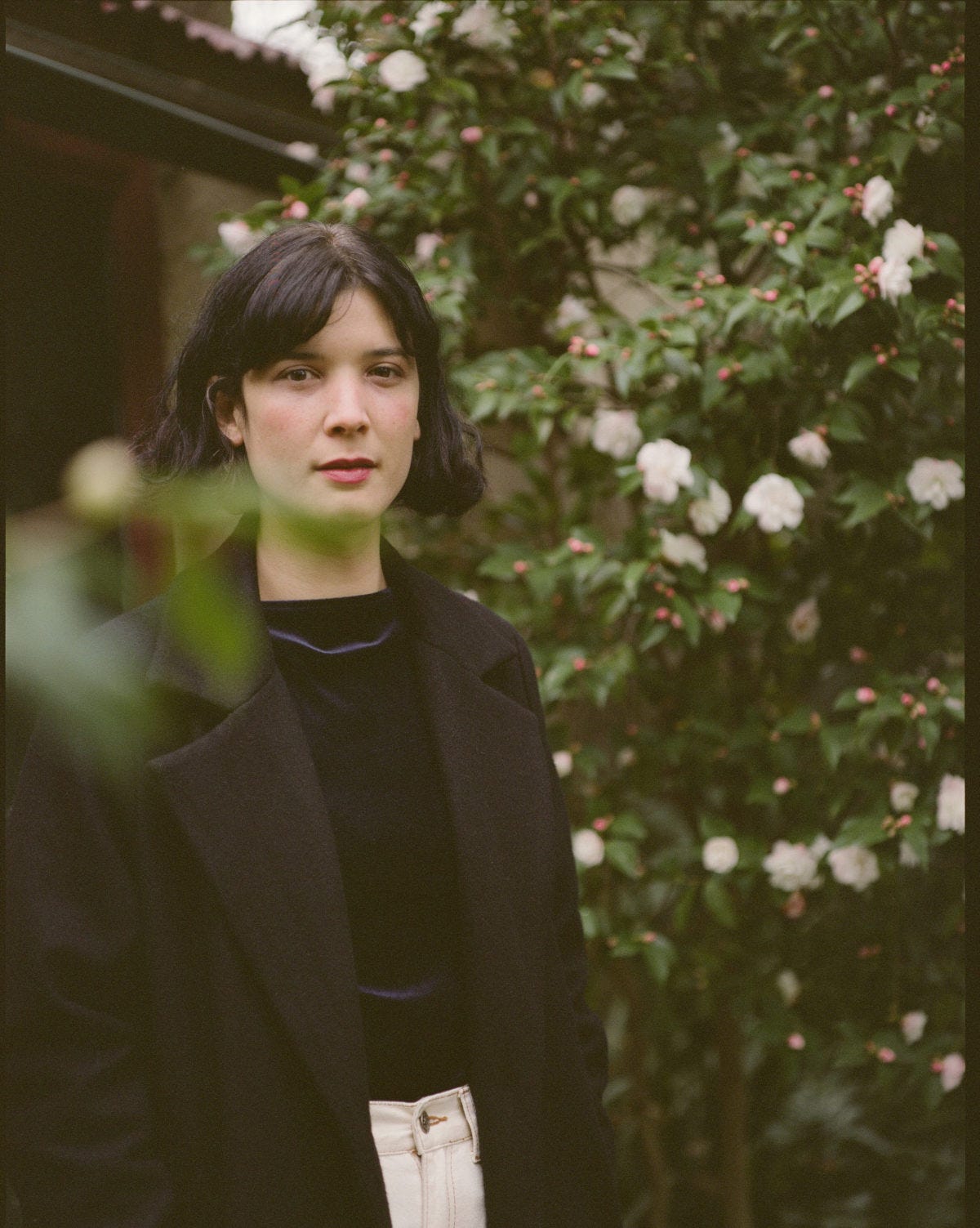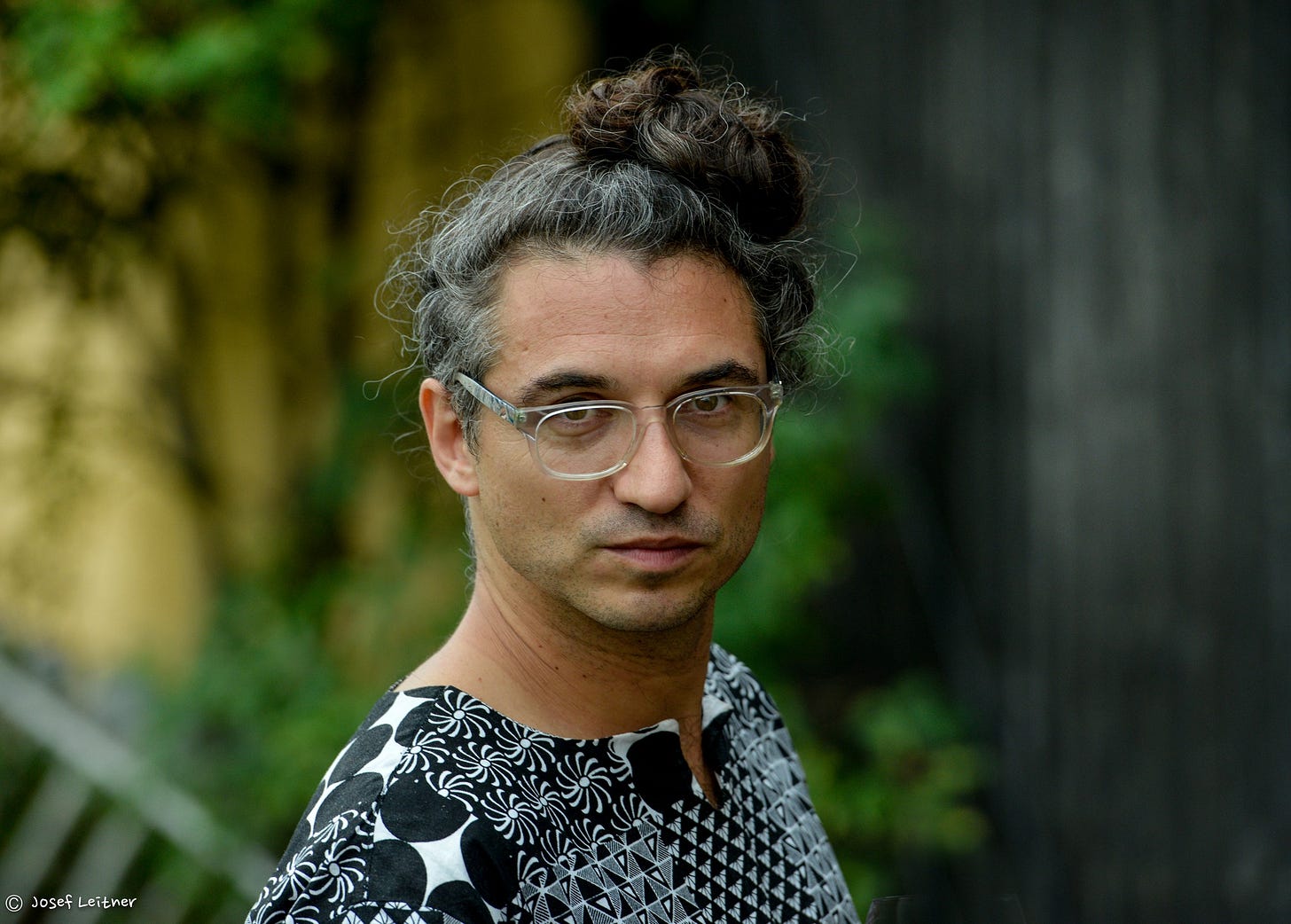Southern Hemispheres
Maria Moles, Leo Genovese
Maria Moles finds her path
Australian drummer Maria Moles, who performs at KM28 on Wednesday, June 21, seems to be a seasoned, polystylistic player, working in countless collaborative contexts, whether rock bands or improvised sessions, but the music by her that’s caught my attention over the last couple of years has been made by herself. I was beguiled by her 2022 For Leolanda (Room40), an elusive hybrid of ambient synthesizer tones and rigorous drumming that seemed to eschew any sort of western groove. It turns out that most of the rhythms on the four-part recording were inspired by kulintang music of the Philippines, a tradition I’m almost wholly ignorant of apart from some of the experimental explorations of the discipline by Susie Ibarra. In an interview by Mara Schwerdtfeger published online by the Drifting Pulse, she says, “For Leolanda was a way of learning more about my mother’s Filipino ancestry. It’s something that I haven’t really ever embraced properly before. I wanted to listen to a lot of music from that region but I found that it was quite difficult to, without traveling to the Philippines. The music is quite similar to gamelan, but it seems like it’s not really represented here as much.” Most of her research came from a couple of ethnographic recordings.
On “River Bend'' woozy, layered electronic tones open up the piece, occasionally interrupted by gaseous arpeggios, but they become more compelling when Moles begins shaping rhythms on a standard kit drum. She ranges all over the kit, with a rolling patter tangling with pinging metallic percussion, cymbal play, and damped tom sounds, a kind of internal monolog that spills out across the hypnotic electronic atmosphere, with fleeting collisions of a particular cymbal resonance and a synthetic wash. The forceful, groove-heavy drumming that occupies the first third of “In Pan-as” grew out of patterns she discovered on the recordings, but over time, as she developed her ideas, new rhythms emerged, leaving a husk—albeit a prominently felt one—of the source material intact. The kinetic beats subside, washed away by unstable tones—part electronic, part bowed metal—and pierced by metal tones that all move around the stereo space, decaying sensually. You can listen to it, below. “Mansaka” was likewise inspired by music by the titular Filipino tribe in Compostela Valley in the region of Mindanao, and although percussion only encroaches on the ambient drift during the final couple of minutes, her meticulously rendered metallic percussion utterly transforms the piece. Only the closing track, “Distant Hills,” is built from actual kulintang sounds, which she recorded at Monash University in Melbourne, when she was still exploring what the instrument actually sounded like. Moles displays a genuine feel from the outset, exploring as a cloud of ambience drips down, providing some extra jolts of tingling resonance.
In April Moles released another impressive piece, a 25-trip titled “A spark, a reminder” on the Longform Editions platform. The twinned synthesizers and drum kit instrumentation remains—although a simple bass line is played by Tim Harvey in the final section—but there’s no clear external inspiration beyond creating something meditative. There’s also less harmonic interplay between electronics and percussion. When the calm is pierced by beats after eight minutes or so, she unravels an increasingly jittery interplay between the component parts of the drum kit that’s simultaneously agitated and virtuosic without feeling that way at all—in fact, there almost seems to be a polymetric Milford Graves thing happening. The electronics drift away and the conversation proceeds as a dialog between snare and tom, slowing time to a near standstill before cymbals rejoin leading to an evolving space-out enfolding the electric bass ostinato and an organ-like drone, spiked by the occasional synth crest. Check it out below.
Pianist Leo Genovese keeps stretching out
Argentine keyboardist Leo Genovese must rate among the most versatile figures in jazz and improvised music today, a musician who left his homeland to study at the Berklee College of Music in Boston back in 2001 and has steadily widened his scope ever since. He’s a devoted student of post-bop tradition, and that was the context I initially heard him in a decade ago. Indeed, he’s become an in-demand sideman in varied groupings, working with the likes of Wayne Shorter, Esperanza Spalding, José James, and Dave Liebman, to say nothing of sessions with pop and rock artists like Residente and Mars Volta—he just finished some European dates with the latter. But in the last few years he’s unleashed a torrent of recordings that have demonstrated a nonchalant versatility, finding him equally at home in straight-ahead situations as well as free contexts, where’s thrived in the context of players like bassist William Parker and pianist Cooper-Moore. He’s been on a string of recordings released by 577 and he’s excelled in every context.
On July 7, 577 will release Shine Hear Vol. 1, a new collective recording with Parker, multi-instrumentalist Daniel Carter, and drummer Francisco Mela that brings an impressive rhythmic clarity to the freely improvised session. Genovese toggles easily between blistering sheets of sound, splattering glassy notes in unhurried tangles that open up and cool down with preternatural ease and grace. In fact, his stop-on-a-dime adaptability tends to function as a crucial glue that connects the most outward bound passages to more measured, gently swinging moments. He’s able to adjust with stunning alacrity, complementing Parker’s improvised turn on the double reed gralla just as adroitly as he interacts with his thrumming bass lines. The album captures the four musicians locked into a trance-driven frenzy, adding and subtracting elements without a hiccup, whether it’s Mela’s frenzied Cuban chants or Parker’s meditative shakuhachi. Below you can check out the relatively brief title track.
Genovese’s sweet spot seems to be rangy post-bop, and he often appears in collective trios of impressive concision and lyric generosity. One of his most trusted collaborators is the bassist Demian Cabaud, a fellow Argentinean who studied with him in Boston, before relocating to Porto, Portugal. They’ve been working together in fits and starts for more than two decades, and they’re collaborating again in a solid new trio with Portuguese drummer Marcos Cavaleiro. Their new album Estrellero (Sunnyside), drops on July 14, and it captures a more mainstream, swing-driven sound. That focus doesn’t preclude plenty of experimentation and flux: the pianist’s insistent “Always” was inspired by Gnawan music from Morocco even if doesn’t really reflect that hypnotic tradition stylistically you can hear it in the maniacally focused, cycling groove and the tightly-coiled tonal range of the pianist, while “Aquel Lugar” opens with some tender harmonium before the full band kicks in, ruminating without any harmonic guidelines in a way that’s as open as the session with Parker, Carter, and Mela. Below you can hear the album’s opening track “Qom,” a Cabaud tune inspired not by the Iranian city, but the language of an indigenous people from northeastern Argentina.
Genovese rolls through town on Friday, June 23 for a set with a pair of Berlin-based players, drummer Joe Hertenstein and cellist Martín Iannacone, at the Jugend[widerstands]museum.
Recommended concerts in Berlin this week
June 21: Kevin Morby, Macie Stewart, 8 PM, Columbia Theater, Columbiadamnn 9-11, 10965 Berlin
June 21: Olivia Shortt, Maria Moles, 8 PM, KM28, Karl-Marx-Str. 28, 12043 Berlin
June 22: Ustad Noor Bakhsh, 8 PM, Jugend[widerstands]museum Galiläakirche, Rigaer Str. 9/10, 10247 Berlin
June 22: Tinariwen, 8 PM, Festaal Kreuzberg, Am Flutgraben 2, 12435 Berlin
June 23: Leo Genovese, Joe Hertenstein & Martín Iannacone, 8 PM, Jugend[widerstands]museum Galiläakirche, Rigaer Str. 9/10, 10247 Berlin
June 24: Rashad Becker & Okkyung Lee, 8 PM, Morphine Raum,
Köpenicker Straße 147 10997 Berlin (Hinterhof 1. Etage)
June 24: David Grubbs, Jan St. Werner, Louis Chude-Sokei, and Julia Reidy, 8 PM, KM28, Karl-Marx-Str. 28, 12043 Berlin
June 25: King Ayisoba, 7 PM, Klunkerkranich, Karl-Marx-Straße 66, 12053 Berlin
June 26: King Ayisoba, 8 PM, Jugend[widerstands]museum Galiläakirche, Rigaer Str. 9/10, 10247 Berlin



